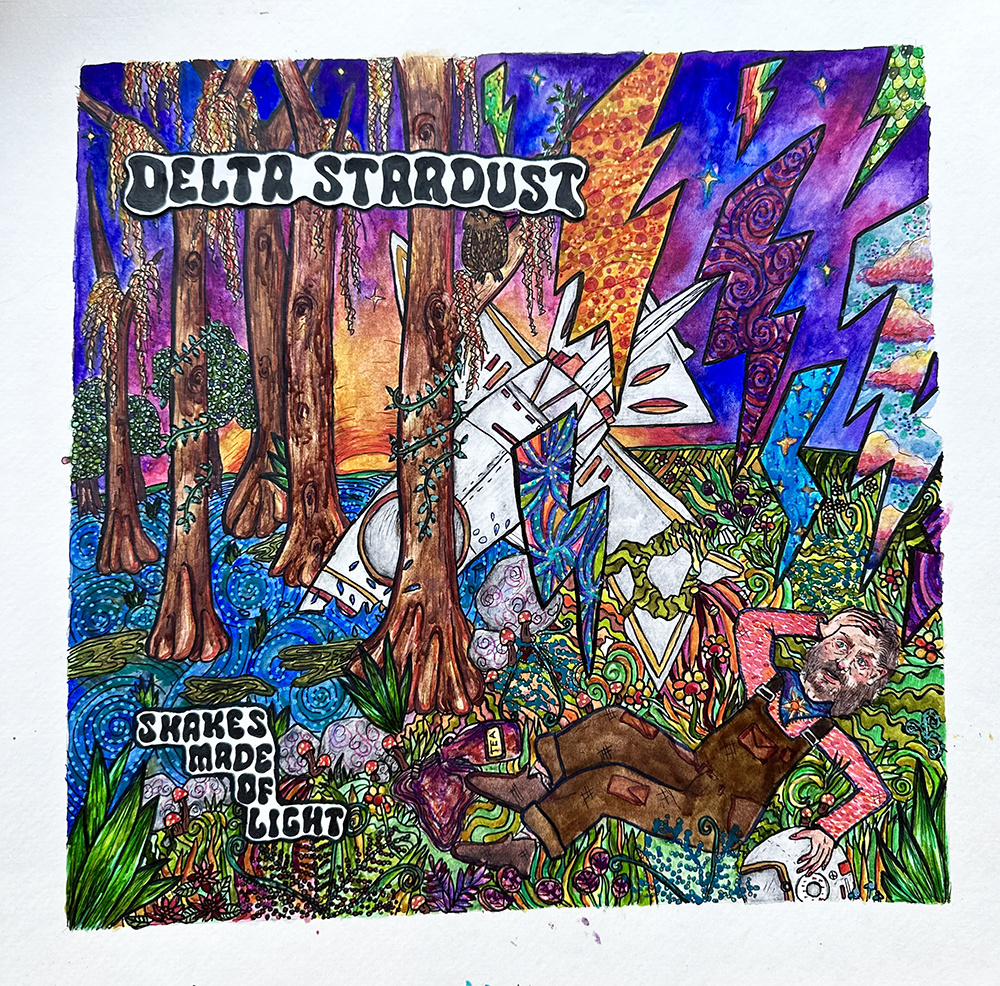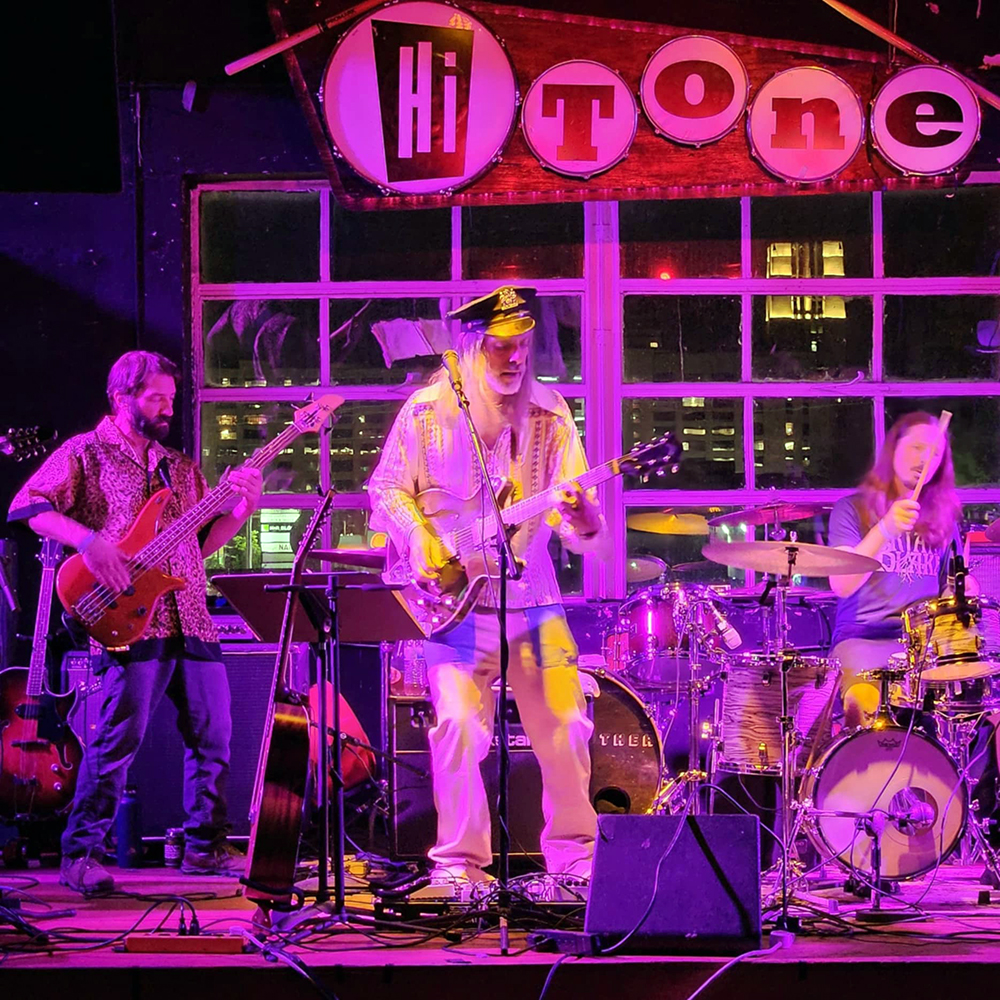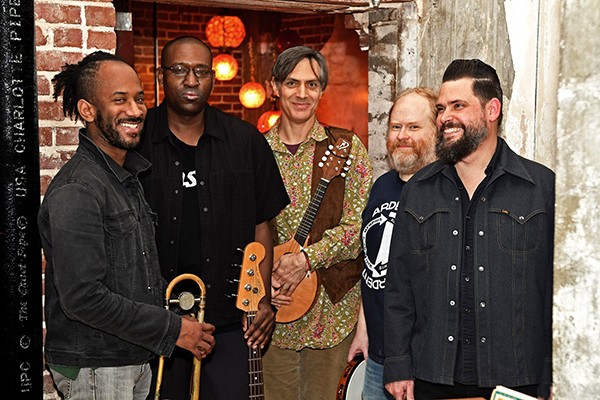The blues have always hung out at the crossroads of the mundane and the supernatural — as when Robert Johnson exhorted anyone listening to “bury my body down by the highway side, so my old evil spirit can get a Greyhound bus and ride.” But in spite of the blues walking side by side with the devil and buying mojo hands for so long, the genre was never quite associated with shamanic states of consciousness until the ’60s, when tripping hippies folded the blues into both the folk and the heavy rock they favored. Yet when that sonic mash up coalesced into psychedelic rock, the music lost all its grounding in a particular place. It was largely part of the everywhere/nowhere world of pop music, never spawning a site-specific tag analogous to “Delta blues,” but rather proffering a universal message of peace, love, and understanding.
Now, with the advent of a new Memphis/North Mississippi band, Delta Stardust, that may well be changing. As the band’s chief songwriter Michael Graber, aka Spaceman, puts it, “We wanted to go for this transcendence, but we also wanted to be from somewhere. It’s that whole yin-yang, push-pull thing.”

Beyond being an abstract statement of the band’s mission, those words also capture the sound they’ve come up with, which can be heard on their debut album, Snakes Made of Light, released on January 24th. At the foundation of most tracks is the jangling, earthy, ramshackle string band sound to which Graber and his new/old bandmates have devoted themselves since at least the mid-’90s heyday of Prof. Elixir’s Southern Troubadours, through the venerable Bluff City Backsliders, and on into more recent projects under the name Graber Gryass. All these have sported, to varying degrees, Graber’s songwriting, which often blends the archaic language of the Carter Family with Graber’s more Whitman-esque, visionary poetry. This holds true for his work for Delta Stardust. But the new band also explores novel audio flavors.
“We gave ourselves permission to bring in all kinds of different textures,” says Graber of the new sonic stew. “You know, the synthesizers, the mellotrons. We recorded at the home studio of John Kilgore, who was the co-producer and engineer. He’s the engineer at Zebra Ranch studio [established near Coldwater, Mississippi, by the late Jim Dickinson 30 years ago]. But John also makes his own guitar pedals and has about 400. And we had tons of Moogs and different compressors. He’s like a Brian Eno in Senatobia. There, in his home studio, John said, ‘If you can dream it, I can find the sound equivalent.’ So we were able to add that alchemical — we call ‘stardust’ — texture that way.”
Thus the yin-yang qualities were baked into the band’s sound simply by virtue of where they cut the music. Even as they fired up old Moog synthesizers, they never forgot that they were in Senatobia, Mississippi. “That’s why we call the genre ‘roots psychedelia,’” Graber explains. “What would happen if, just to take any example, if The Chemical Brothers or The Flaming Lips were actually from the Mississippi Delta? And they had all that burden of influence, but they still wanted to hit escape velocity, too, so to speak, right? If they didn’t want to just rewrite Beatles chord structures, but wanted to talk to their ancestors, in a sense, yet also reach for new heights?”
It should be noted that this cornucopia of sounds is deployed with some restraint, compared to your typical synthesizer band, because the string band is always holding down the fort. And some of the sounds are nonelectronic, yet still unfamiliar in the jug band context. Like the chortling “Hoooo!” that opens “Owl in My Backyard,” a bit of field recording that adds a visceral dimension to a song about a bird that “kisses creation on the forehead each night.” A few tracks later, “Two Questions” opens with frogs and crickets before the swooping, lush chords of Eric Lewis’ pedal steel sweep you away.
Even that opening pastoral evolves before reaching “escape velocity,” as Graber notes. “Then you can hear The Band influences on the chorus, with the accordion and dobro, and then it gets into a weird sound somewhere between Pere Ubu and Black Sabbath, as kind of an inner dialogue, right? But then weaving it all together. Just trying to hit that range of emotions was a joy, and the band was willing to do it as well. You know, we cut most of the stuff live, and then we did some overdubs.”
Recording the basic tracks live was made possible in part by the caliber of musicianship that the core membership of Delta Stardust represents, including Andy Ratliff (a “key collaborator” who goes back to the Prof. Elixir days), Carlos Gonzales, Jesse Dakota Williams, and Scott Carter, as well as many virtuosic cameos by Grayson Smith, Mark Jordan, Victor Sawyer, Jeremy Shrader, Tom Link, Robert Allen Parker, Julia Graber, Eric Lewis, and Kitty Dearing.
The most “topical” track is arguably “Memphis Tattoo,” which brings some uniquely urban concerns into the album’s lyrical universe. “I think anyone in Memphis can relate to the story behind that song,” says Graber. “I was running on the Greenline and I got shot at. The bullet just buzzed right past me into the bushes, and my dog took off. There was smoke everywhere. I called 911, and I posted on social media about it. And then everyone started telling me about how they have these gunshot wounds. You know, people have them as almost a badge of joy. And people start piling on to that post and even posting pictures and other things about their gunshot wounds that have healed. So then I started thinking: What is a Memphis tattoo, but a healed gunshot wound?”
And therein lies yet another opposition held in tension, where the folk harmonies and strums of the music, and psychedelia’s promise of transcendence, undergird an all-too-real, yet somehow hopeful take on the gritty world of today. “The bittersweetness,” says Graber, “is that only the survivors can sing it. But it’s just life here, you know?”
Delta Stardust will celebrate the release of their debut album at the New Memphis Psychedelic Festival, Friday, February 7th, at B-Side Bar, 7 p.m. Other bands at the festival will include Twin Face Kline, Arc of Quasar, and The Narrows.

 Photographs courtesy of Michael Graber
Photographs courtesy of Michael Graber 
